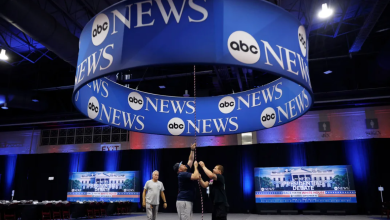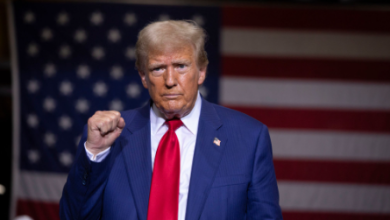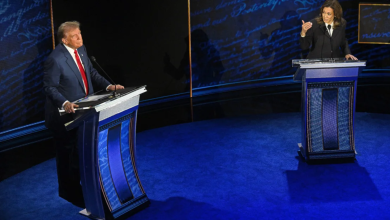Romania: the war has reached NATO’s door
The Romanian sailors first reacted with astonishment, then with panic. At dawn, they film the flying drones with their smartphones – like little dots in the sky.
“They’re going to let them blow up here, they’re going to fall right on the harbor,” says one of the men in shock. And indeed – soon a loud explosion erupts a few hundred meters away.
“Guys, let’s run, the war has already started off the Romanian coast,” called another sailor.
In the early hours of July 24, Russia sent 15 Iranian Shahed drones against the Ukrainian Danube port of Reni. Some were intercepted by Ukrainian air defenses, others exploded in the harbor and destroyed some of the warehouses and silos for Ukrainian grain. Seven people were injured. A Romanian cargo ship was also damaged in the attack.
A New Level of Escalation
Never before has Russia’s war against Ukraine been so close to NATO’s contours. The Danube port of Reni is on the border between Ukraine, Romania, and Moldova, about 120 kilometers west of the Danube Delta in the Black Sea. There are no more than 200 meters between the ruined warehouses of the port of Reni and the thalweg marking the border with Romania.
The Moldovan Danube port of Giurgiulesti is five kilometers up the river, and the distance to the Romanian city of Galats, population 220,000, is ten kilometers as the crow flies. It is pure luck that the not particularly accurate Iranian drones did not land on NATO territory.
The attack on Reni represents a new degree of escalation of the Russian bomb terror that began a week ago in the Black Sea ports of Odesa and Mykolaiv, aimed mostly against the infrastructure that ensures Ukrainian grain exports.
Russian missiles have flown through part of Romanian airspace before, and one landed in the forests of Poland. But Russia had never before launched a deliberate attack so close to NATO’s external border, against a civilian target and in an area without significant military infrastructure.
The Danube route will be expanded
“Vladimir Putin wants to block Ukraine’s grain exports by all means and at the same time take revenge for the fact that certain sanctions against Russia, such as those in the banking sector, have not been lifted,” Romanian political scientist Armand Gosu told DV.
Ukraine urgently needs income from the sale of grain and oil crops, for the export of which there were three routes until now. The largest amount was transported from the ports of Odesa and Mykolaiv via the Black Sea. The export took place thanks to the so-called grain deal between Russia and Ukraine before Moscow pulled out of it. Another part was transported by land through Romania, Hungary, and Poland. The third route passes through the Danube Delta and the Ukrainian Danube ports of Reni and Ismail, as well as through a part of the Black Sea that falls into Romanian territorial waters.
Ukraine is planning a large-scale expansion of this route. What does Putin want to demonstrate? Much less grain can be transported through the Danube Delta compared to the Black Sea route from Odesa and Mykolaiv.
In view of this, the risk to Russia of bombing Reni located on NATO’s border is significantly greater than the benefits. But according to political scientist Armand Gossou, the strike aims at much more than blocking grain exports.
“Putin would like to show that he doesn’t care how close his strikes are to NATO territory. More than that: Putin’s goal is to expose NATO’s indecision through this demonstration.”
The Romanian public reacted with indignation and concern to the bombing of the Ukrainian Danube ports – not only because war appeared on the doorstep. The Danube Delta is an area where the citizens of the two countries are connected historically, linguistically, and culturally. For example, in the port city of Reni, more than half of the residents are ethnic Romanians.
The “cynical game” of the West In contrast to the public, official reactions in Romania were suspiciously restrained. President Klaus Iohannis only released a tweet in which he stated that he strongly condemned the Russian attacks near Romania. And the Ministry of Defense in Bucharest succinctly noted that “there is no direct military threat to the national territory”.
So far, NATO has not come out with an official position. The NATO-Ukraine Council has been meeting for a week now, during which the wave of Russian attacks against Odesa and Mykolaiv continues. But there is no condemnation or warning to Russia because of the bombing near the NATO border by the Alliance. Until the publication of this text, the NATO press center did not respond to DV’s inquiry.
Political scientist Armand Gossou says NATO wants to “avoid escalation at all costs”. “Meanwhile, the elites of the West have grown weary of war and are more worried about the collapse of Russia than the defeat of Ukraine.”
According to the political scientist, this is precisely the reason why Ukraine does not receive as much support as it needs. “If the conflict in Ukraine turns out to be prolonged, it will not be because of Russia, but because the West is supplying too few weapons. This is a cynical game,” Gosu believes.



